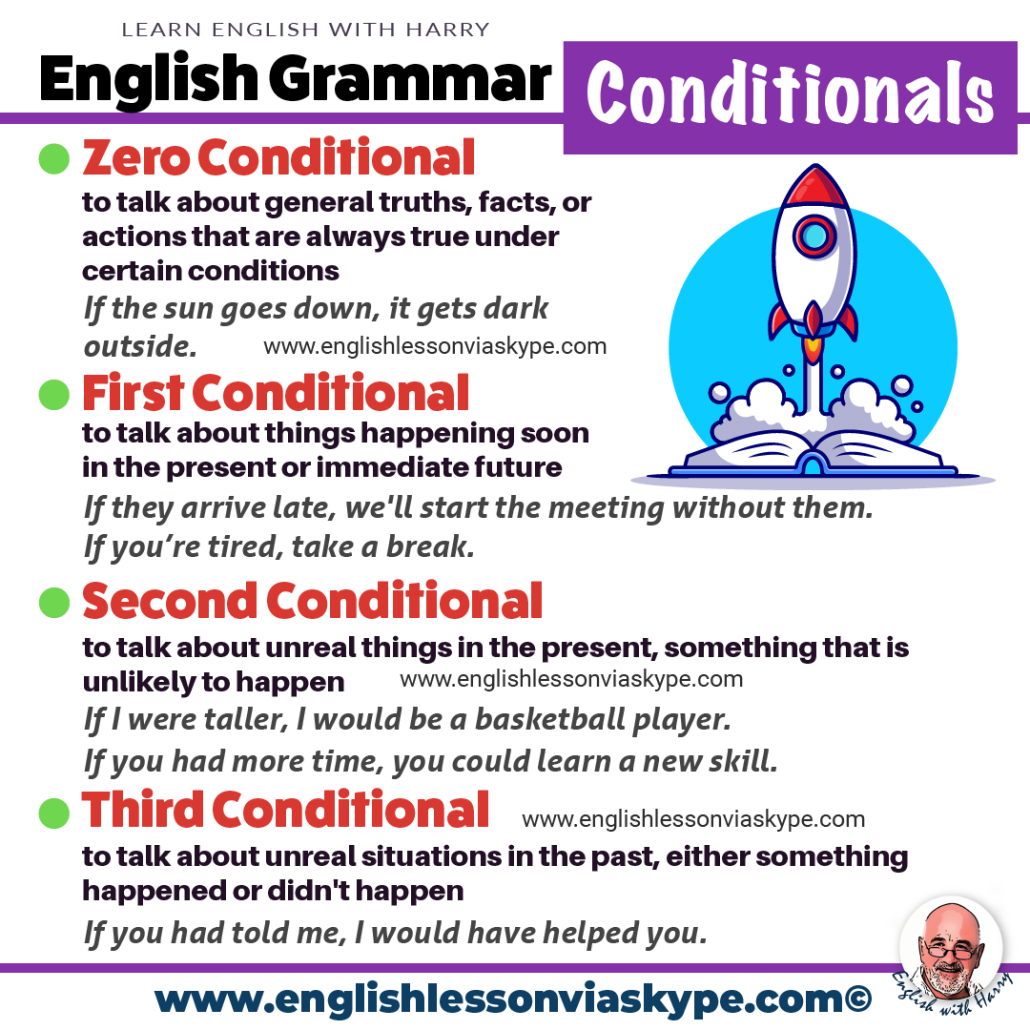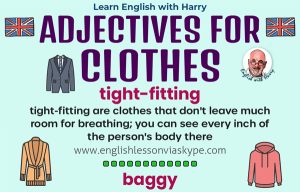How to use conditionals in English? This question is asked by many English learning students. The truth is that ESL students, even at an advanced English level, still have issues with using conditional tenses in English.
This lesson will explain the basic English grammar rules on how to use conditionals in English. Improve your English skills and gain confidence in speaking and writing.
Listen to the podcast Speak Better English with Harry or watch it on YouTube at Learn English with Harry. englishclass101
English grammar rules
How to use conditionals in English?
Harry
In this English lesson, we’ll focus on conditional tenses. Many viewers and listeners asked for tips about these because they’re tricky and people find them hard.
We’re here to give you a general idea, helpful hints, and tips on how to use and understand them.
Remember, we’re trying to help you improve your English for better talks, business, and just talking to others. We also cover phrasal verbs and expressions.
This time, we’re checking English grammar rules about those tenses.
Let’s begin. There are four we’ll talk about: zero, one, two, and three. I’ll explain them a bit more.
improve english on a budget
Online English Courses from €7.99
It seems we can't find what you're looking for.
Zero Conditional
We use zero conditional to talk about general truths, facts, or actions that are always true under certain conditions. It’s like saying “whenever this happens, that always happens.” It’s used to express things that are consistent and true all the time.
In this type of conditional, we use the present simple tense in both the “if” clause (condition) and the main clause (result).
Examples:
When/if it snows, the roads get slippery and very dangerous.
If you boil water at 100°C, it evaporates and turns into steam.
If the sun goes down, it gets dark outside.
If you mix red and blue, you get purple.
If you touch fire, it burns.
If you drop an object, it falls to the ground.
First Conditional
We use the first conditional when there’s a good chance of something happening and its outcome depends on a specific condition being met.
In the first conditional, we use the present simple tense in the “if” clause (condition) and the modal verbs can/may/might/must/should followed by the base form of the verb in the main clause (result).
In addition, the main clause can include imperative sentences, which give direct commands or instructions.
Examples:
If I see him, I will tell him you said “hello.”
If it’s sunny tomorrow, we can have a picnic in the park.
If you finish your homework early, you may watch TV later.
If we miss the bus, we’ll walk to the shops.
If it gets too cold, you should wear a jacket.
If they arrive late, we’ll start the meeting without them.
How to use conditionals in English?

Second Conditional
We use the second conditional to talk about unreal things in the present, something that is unlikely to happen. We also use it to give advice.
Examples:
If I were you, I would go to the doctor.
(I am not you, this is an unreal situation in the present.)
If I were taller, I would be a basketball player.
(I’m not going to be any taller than I am now. It’s virtually impossible.)
If I were rich, I would travel the world.
(I’m not, so I can’t travel the world.)
If you had more time, you could learn a new skill.
(I don’t have additional time, so I can’t learn a new skill.)
If she were here, she would enjoy this movie.
(She is not here at the moment.)
If we had a bigger garden, we could grow more vegetables.
(We have a small garden and can’t grow vegetables.)
If they knew the answer, they would tell us.
(They don’t know the answer.)
book your trial English Lesson
Third Conditional
We use the third conditional to talk about unreal situations in the past, so either something that happened in the past or didn’t happen in the past. We also use it to express regrets and criticism.
Examples:
If I hadn’t driven my car so fast, I wouldn’t have crashed it.
(In reality, I did drive my car too quickly, and I did crash it.)
If I had known you were sick, I would have called you.
(In reality, I didn’t know you were sick, and I didn’t call you.)
If I had studied harder, I would have passed the exam.
(I didn’t study hard enough and failed the exam.)
If you had told me, I would have helped you.
(You didn’t tell me, so I didn’t help you.)
If she had gone to the party, she would have met new people.
(She didn’t go to the party and didn’t meet any new people.)
If we had known the way, we could have reached the destination faster.
(We didn’t know the way and it took us a while to get there.)
If they had tried harder, they might have won the competition.
(They didn’t try and lost the competition.)
How to use conditionals in English?

Mixed Conditionals
Mixed conditionals combine elements of different types of conditionals in a single sentence. They are used to show complex relationships between time and condition, often to express unreal or hypothetical situations in the present with consequences in the past, or vice versa.
- The “if” clause uses the past tense (usually past perfect) to describe the unreal or hypothetical condition.
- The main clause uses a modal verb (such as would, could, might) and a base verb to indicate the result or consequence.
Here are the situations in which we can use mixed conditionals:
1️⃣ Unreal Present with Past Result: When you want to express a current situation that is unreal, followed by a consequence that would have happened in the past.
Example:
If I had studied more in the past, I would be more knowledgeable now.
2️⃣ Unreal Past with Present Result: When you want to discuss a past condition that didn’t happen, leading to a present consequence.
Example:
If she had taken the job last year, she would be working abroad now.
3️⃣ Unreal Past with Past Result: When you want to describe a past condition that didn’t happen, and the outcome would have occurred in the past.
Example:
If I had known about the event, I would have attended it last month.
4️⃣ Unreal Present with Future Result: When you want to convey an ongoing present condition that is unreal, leading to a future consequence.
Example:
If he weren’t so busy with work, he might travel with us next week.
5️⃣ Unreal Future with Present Result: When you want to discuss an unreal future condition and its present consequence.
Example:
If they didn’t have plans for tomorrow, they could join us today.
6️⃣ Unreal Future with Past Result: When you want to express an unreal future condition and its consequence in the past.
Example:
If we didn’t have other commitments next month, we could have attended the conference last week.
So if you follow those basic grammar rules and do some practice, you will be able to understand how to use conditionals in English much much easier. If you have any questions, come back to me at www.englishlessonviaskype.com. Always happy to hear from you and always happy to include your suggestions as this one was a suggestion from some of our listeners and our readers.
Thanks for listening, thanks for watching. Join me again soon.
speak better English with Harry podcast- episode 443
more information
For more information on English grammar rules, English collocations and English idioms, check out the links below:
English idioms related to habits
How to use English prepositions correctly
You can always study English advanced level at Learning English with the BBC and British Council Learn English.
You will love these English lessons

Uncountable and Plural Nouns in English
Here you will learn how to use uncountable and plural nouns in English correctly. Scroll down to watch a video


How to talk about Money in English
Let’s learn to talk about money in English. Money is important in our daily lives. It is also a popular


Adjectives To Describe Clothes In English
Learn adjectives to describe clothes in English. Useful words that will help you when you’re talking about clothes and outfits.